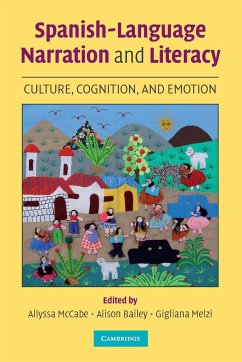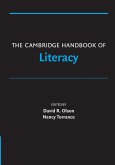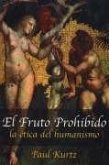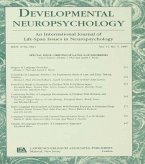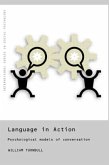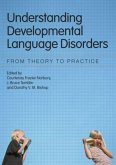Spanish-Language Narration and Literacy
Herausgeber: McCabe, Allyssa; Melzi, Gigliana; Bailey, Alison L.
Spanish-Language Narration and Literacy
Herausgeber: McCabe, Allyssa; Melzi, Gigliana; Bailey, Alison L.
- Broschiertes Buch
- Merkliste
- Auf die Merkliste
- Bewerten Bewerten
- Teilen
- Produkt teilen
- Produkterinnerung
- Produkterinnerung
Deepens our understanding of narration in Latino cultures, methods of thinking and expressing emotion, and implications for school achievement.
Andere Kunden interessierten sich auch für
![The Cambridge Handbook of Literacy The Cambridge Handbook of Literacy]() The Cambridge Handbook of Literacy73,99 €
The Cambridge Handbook of Literacy73,99 €![El Fruto Prohibido El Fruto Prohibido]() Paul KurtzEl Fruto Prohibido20,99 €
Paul KurtzEl Fruto Prohibido20,99 €![Origins of Language Disorders Origins of Language Disorders]() Origins of Language Disorders60,99 €
Origins of Language Disorders60,99 €![Language in Action Language in Action]() William TurnbullLanguage in Action64,99 €
William TurnbullLanguage in Action64,99 €![Understanding Developmental Language Disorders Understanding Developmental Language Disorders]() Understanding Developmental Language Disorders71,99 €
Understanding Developmental Language Disorders71,99 €![Artificial Intelligence Artificial Intelligence]() F. H. GeorgeArtificial Intelligence53,99 €
F. H. GeorgeArtificial Intelligence53,99 €![Delusion and Dream Delusion and Dream]() Sigmund FreudDelusion and Dream19,99 €
Sigmund FreudDelusion and Dream19,99 €-
-
-
Deepens our understanding of narration in Latino cultures, methods of thinking and expressing emotion, and implications for school achievement.
Hinweis: Dieser Artikel kann nur an eine deutsche Lieferadresse ausgeliefert werden.
Hinweis: Dieser Artikel kann nur an eine deutsche Lieferadresse ausgeliefert werden.
Produktdetails
- Produktdetails
- Verlag: Cambridge University Press
- Seitenzahl: 368
- Erscheinungstermin: 11. Dezember 2008
- Englisch
- Abmessung: 229mm x 152mm x 22mm
- Gewicht: 597g
- ISBN-13: 9780521710046
- ISBN-10: 0521710049
- Artikelnr.: 24425633
- Herstellerkennzeichnung
- Libri GmbH
- Europaallee 1
- 36244 Bad Hersfeld
- gpsr@libri.de
- Verlag: Cambridge University Press
- Seitenzahl: 368
- Erscheinungstermin: 11. Dezember 2008
- Englisch
- Abmessung: 229mm x 152mm x 22mm
- Gewicht: 597g
- ISBN-13: 9780521710046
- ISBN-10: 0521710049
- Artikelnr.: 24425633
- Herstellerkennzeichnung
- Libri GmbH
- Europaallee 1
- 36244 Bad Hersfeld
- gpsr@libri.de
1. Introduction Alison Bailey, Allyssa McCabe and Gigliana Melzi; Part I.
Parent-Child Interaction: 2. Cultural variations in mother-child narrative
discourse style Margaret Caspe and Gigliana Melzi; 3. Early
socio-communicative narrative patterns during Costa Rican mother-infant
interaction Pablo Stansbery; 4. Lessons in mother-child and father-child
personal narratives in Latino families Tonia N. Cristofaro and Catherine S.
Tamis-LeMonda; 5. Evaluation in Spanish-speaking mother-child narratives:
the social and sense-making function of internal state references Camila
Fernández and Gigliana Melzi; 6. Love, diminutives, and gender
socialization in Andean mother-child narrative conversations Kendall A.
King and Colleen Gallagher; Part II. Developing Independent Narration: 7.
The intersection of language and culture among Mexican-heritage children
three to seven years old Alison Wishard Guerra; 8. Beyond chronicity:
evaluation and temporality in Spanish-speaking children's personal
narratives Paola Uccelli; 9. Narrative stance in Venezuelan children's
stories Martha Shiro; 10. Mestizaje: Afro-Caribbean and indigenous Costa
Rican children's narratives and links with other traditions C. Nicholas
Cuneo, Allyssa McCab, and Gigliana Melzi; Part III. Links to Literacy and
Other School Achievements: 11. Latino mothers and their preschool children
talk about the past Alison Sparks; 12. The contribution of Spanish-language
narration to the assessment of early academic performance of Latino
students Alison L. Bailey, Ani Moughamian and Mary Dingle; 13. Cultural
variation in narrative competence and its implications for children's
academic success Sarah W. Beck.
Parent-Child Interaction: 2. Cultural variations in mother-child narrative
discourse style Margaret Caspe and Gigliana Melzi; 3. Early
socio-communicative narrative patterns during Costa Rican mother-infant
interaction Pablo Stansbery; 4. Lessons in mother-child and father-child
personal narratives in Latino families Tonia N. Cristofaro and Catherine S.
Tamis-LeMonda; 5. Evaluation in Spanish-speaking mother-child narratives:
the social and sense-making function of internal state references Camila
Fernández and Gigliana Melzi; 6. Love, diminutives, and gender
socialization in Andean mother-child narrative conversations Kendall A.
King and Colleen Gallagher; Part II. Developing Independent Narration: 7.
The intersection of language and culture among Mexican-heritage children
three to seven years old Alison Wishard Guerra; 8. Beyond chronicity:
evaluation and temporality in Spanish-speaking children's personal
narratives Paola Uccelli; 9. Narrative stance in Venezuelan children's
stories Martha Shiro; 10. Mestizaje: Afro-Caribbean and indigenous Costa
Rican children's narratives and links with other traditions C. Nicholas
Cuneo, Allyssa McCab, and Gigliana Melzi; Part III. Links to Literacy and
Other School Achievements: 11. Latino mothers and their preschool children
talk about the past Alison Sparks; 12. The contribution of Spanish-language
narration to the assessment of early academic performance of Latino
students Alison L. Bailey, Ani Moughamian and Mary Dingle; 13. Cultural
variation in narrative competence and its implications for children's
academic success Sarah W. Beck.
1. Introduction Alison Bailey, Allyssa McCabe and Gigliana Melzi; Part I.
Parent-Child Interaction: 2. Cultural variations in mother-child narrative
discourse style Margaret Caspe and Gigliana Melzi; 3. Early
socio-communicative narrative patterns during Costa Rican mother-infant
interaction Pablo Stansbery; 4. Lessons in mother-child and father-child
personal narratives in Latino families Tonia N. Cristofaro and Catherine S.
Tamis-LeMonda; 5. Evaluation in Spanish-speaking mother-child narratives:
the social and sense-making function of internal state references Camila
Fernández and Gigliana Melzi; 6. Love, diminutives, and gender
socialization in Andean mother-child narrative conversations Kendall A.
King and Colleen Gallagher; Part II. Developing Independent Narration: 7.
The intersection of language and culture among Mexican-heritage children
three to seven years old Alison Wishard Guerra; 8. Beyond chronicity:
evaluation and temporality in Spanish-speaking children's personal
narratives Paola Uccelli; 9. Narrative stance in Venezuelan children's
stories Martha Shiro; 10. Mestizaje: Afro-Caribbean and indigenous Costa
Rican children's narratives and links with other traditions C. Nicholas
Cuneo, Allyssa McCab, and Gigliana Melzi; Part III. Links to Literacy and
Other School Achievements: 11. Latino mothers and their preschool children
talk about the past Alison Sparks; 12. The contribution of Spanish-language
narration to the assessment of early academic performance of Latino
students Alison L. Bailey, Ani Moughamian and Mary Dingle; 13. Cultural
variation in narrative competence and its implications for children's
academic success Sarah W. Beck.
Parent-Child Interaction: 2. Cultural variations in mother-child narrative
discourse style Margaret Caspe and Gigliana Melzi; 3. Early
socio-communicative narrative patterns during Costa Rican mother-infant
interaction Pablo Stansbery; 4. Lessons in mother-child and father-child
personal narratives in Latino families Tonia N. Cristofaro and Catherine S.
Tamis-LeMonda; 5. Evaluation in Spanish-speaking mother-child narratives:
the social and sense-making function of internal state references Camila
Fernández and Gigliana Melzi; 6. Love, diminutives, and gender
socialization in Andean mother-child narrative conversations Kendall A.
King and Colleen Gallagher; Part II. Developing Independent Narration: 7.
The intersection of language and culture among Mexican-heritage children
three to seven years old Alison Wishard Guerra; 8. Beyond chronicity:
evaluation and temporality in Spanish-speaking children's personal
narratives Paola Uccelli; 9. Narrative stance in Venezuelan children's
stories Martha Shiro; 10. Mestizaje: Afro-Caribbean and indigenous Costa
Rican children's narratives and links with other traditions C. Nicholas
Cuneo, Allyssa McCab, and Gigliana Melzi; Part III. Links to Literacy and
Other School Achievements: 11. Latino mothers and their preschool children
talk about the past Alison Sparks; 12. The contribution of Spanish-language
narration to the assessment of early academic performance of Latino
students Alison L. Bailey, Ani Moughamian and Mary Dingle; 13. Cultural
variation in narrative competence and its implications for children's
academic success Sarah W. Beck.

